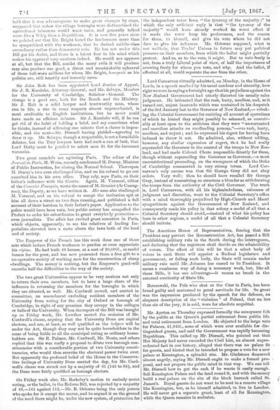On Friday week also, Mr. Berkeley's motion to embody secret
voting, or the ballot, in the Reform Bill, was rejected by a majority of 49,-161 against 112,—Mr. B. Osborne being the only person who spoke for it except the mover, and he argued it on the ground of the need there might be, under the new system, of protection for
the independent voter from "the tyranny. of the majority ;" to which the only sufficient reply is that "the tyranny of the majority" would have already worked its worst effect if it made the voter keep his prefereuces, and the reason for them, to himself, awl give his vote where he did not dare to give his influence. Mr. Osborne supposed, what is not unlikely, that Trades' Unions in future may put political pressure on their members, from which the ballot might partially protect. And so, as to the vote, it might. But to vote freely is not, from a truly Liberal point of view, of half the importance of avowing freely for whom you vote, and why. And the ballot, if effectual at all, would separate the one from the other.






























 Previous page
Previous page